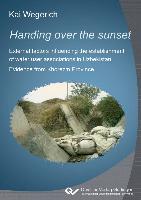Handing over the sunset
BücherAngebote / Angebote:
Recently, large-scale surface-water or canal irrigation systems have been termed ¿a sunset industry' (Rijsberman 2003). Handing over this sunset industry by means of irrigation management transfer (IMT) policies and the creation of water user associations (WUAs) has three main objectives: to increase efficiency, equity, and empowerment.The Uzbek government, together with the international organizations, the United States Agency for International Development (USAID), and the International Water Management Institute (IWMI), is currently promoting IMT and the creation of WUAs nationwide. The onset of the policy seemed to be a rational development since the former state and collective farms, which were also responsible for water management on their territories, were disintegrating, and new private farms were emerging rapidly.This study seeks to assess the potential of IMT policies by examining the broader physical, organizational, socio-economic, and political factors that might facilitate or hinder the main objectives of IMT and the creation of WUAs. These factors are addressed and analyzed separately through eight case study chapters that address questions on basin water management, the organizational capacities, and the socio-political dependencies of the district water management departments, the potential for multi-stakeholder platforms (MSPs), the politics of social network structures, and the process of land reforms.The study concludes that none of the external factors is conducive to the introduction of IMT policies and for creating WUAs. The implication is that IMT policies will not increase efficiency, equity, and empowerment, but could even worsen the water management situation. Furthermore, these policies will not increase the empowerment of either the WUAs or their members. Hence, under the current conditions, handing over the ¿sunset industry' will not lead to a new sunrise for irrigation in Uzbekistan.Kai Wegerich is Assistant Professor at the Irrigation and Water Engineering Group of Wageningen University. He gained his PhD from the School of Oriental and African Studies/London University and worked as a researcher for the Centre for Development Research (ZEF in Bonn/Germany) and as a development worker for the German Development Service (DED) in Khorezm/Uzbekistan. Kai's research interests are social and political aspects of water management in Central Asia, on which he published in various journals. He conducted fieldwork in Uzbekistan, Kazakhstan, Kyrgyzstan and Afghanistan. Kai co-edited the special issue on ¿Emerging issues on land and water in Central Asia' in the Journal Irrigation and Drainage systems (with Jochen Froebrich and Marinus G. Bos) and edited, together with Jeroen Warner, the book ¿The Politics of Water'.
Folgt in ca. 2-3 Arbeitstagen




